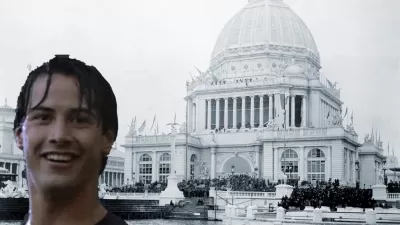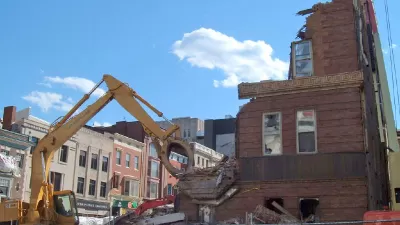A thoughtful look at what made Daniel Burnham's plan for the City of Chicago so successful.
"I started creating a list of attributes of the plan I think contributed to its success. Interestingly, all of these are lessons for today's planners and are often overlooked. So let's consider some of them.
1. It was a private sector, business led initiative. I hear people today moan about the feckless political leadership in their cities. But Chicago wasn't immune from this in the early 20th century. The rest of the civic leadership didn't wait around for the city politicians to get their act together. Rather, the Merchants Club of Chicago (which later merged with the Commercial Club, a still existing organization) stepped in and sponsored the creation of a plan that they saw as critical to overcoming the challenges the city faced at the time and propelling its future growth.
This is very relevant today. Most cities have some corporate/academic vehicle that is often a prime force in local initiatives. This is the logical place for such a civic strategy to be developed today. However, I might suggest that unlike in Burnham's day, having a broader stakeholder base is critical. Thus involving cultural institutions or other non-business groups, plus at least some form of broader community input is essential today. But I still think that it is generally the business community that is the likely sponsor for any plan.
2. It took two years to create. The Burnham Plan was not an overnight creation. It took a lot of research and deliberation. Today, it would likely take even longer. This is another reason why politicians aren't likely to be the driving force. They need solutions that show results within the election cycle. They need to cut ribbons, not produce three year studies."
FULL STORY: Chicago: What Made The Burnham Plan Successful?

Planetizen Federal Action Tracker
A weekly monitor of how Trump’s orders and actions are impacting planners and planning in America.

Chicago’s Ghost Rails
Just beneath the surface of the modern city lie the remnants of its expansive early 20th-century streetcar system.

San Antonio and Austin are Fusing Into one Massive Megaregion
The region spanning the two central Texas cities is growing fast, posing challenges for local infrastructure and water supplies.

Since Zion's Shuttles Went Electric “The Smog is Gone”
Visitors to Zion National Park can enjoy the canyon via the nation’s first fully electric park shuttle system.

Trump Distributing DOT Safety Funds at 1/10 Rate of Biden
Funds for Safe Streets and other transportation safety and equity programs are being held up by administrative reviews and conflicts with the Trump administration’s priorities.

German Cities Subsidize Taxis for Women Amid Wave of Violence
Free or low-cost taxi rides can help women navigate cities more safely, but critics say the programs don't address the root causes of violence against women.
Urban Design for Planners 1: Software Tools
This six-course series explores essential urban design concepts using open source software and equips planners with the tools they need to participate fully in the urban design process.
Planning for Universal Design
Learn the tools for implementing Universal Design in planning regulations.
planning NEXT
Appalachian Highlands Housing Partners
Mpact (founded as Rail~Volution)
City of Camden Redevelopment Agency
City of Astoria
City of Portland
City of Laramie




























